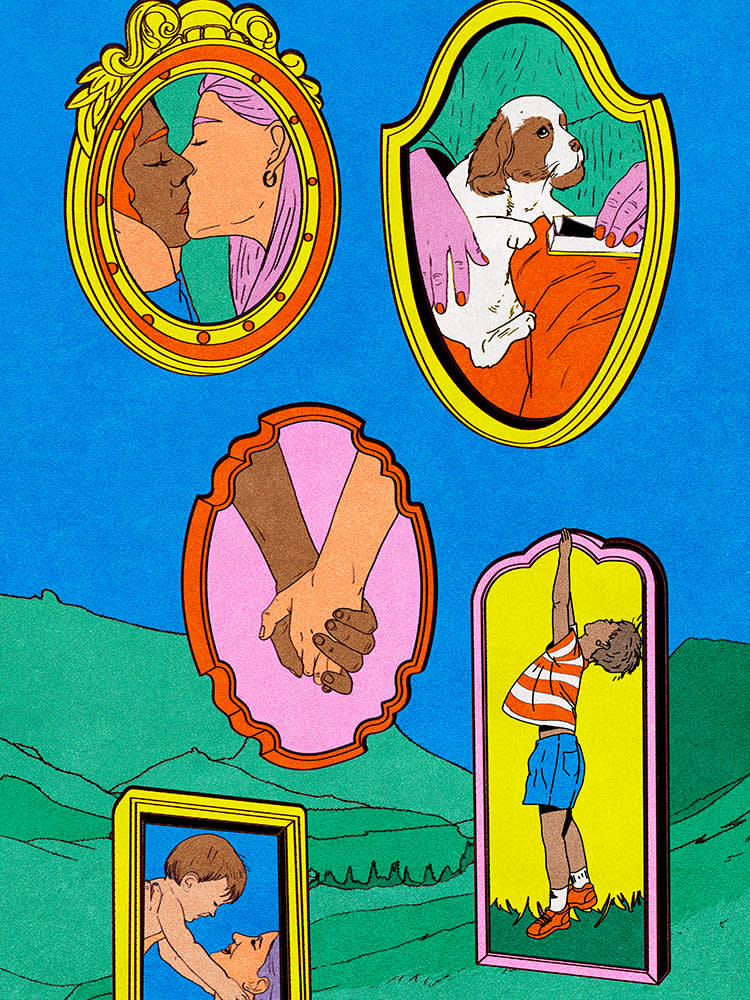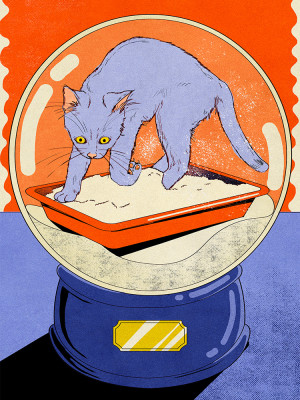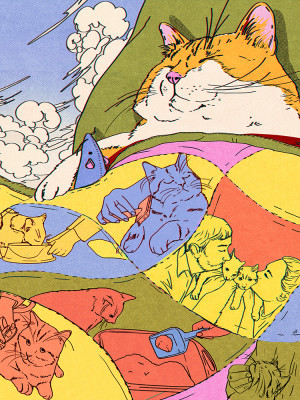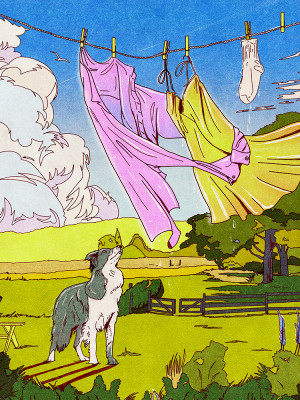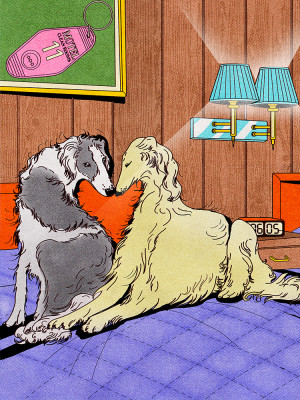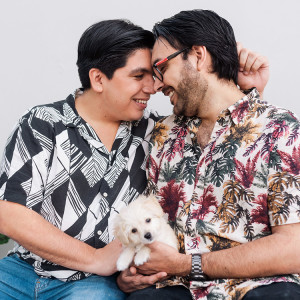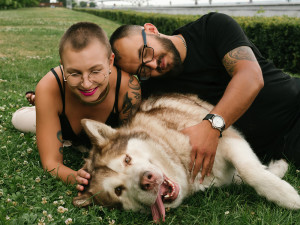Is Raising a Dog With Someone Anything Like Raising a Kid Together?
It’s the great puppy vs baby debate
Heavy Petting is a weekly column full of relationship advice for pet parents – so you and your boo don’t end up fighting like cats and dogs over the cat and dog.
A couple of years ago, I was walking my dog, Finn, around the local streets with my friend who was newly pregnant. She asked, “Have you ever heard that having a dog is a third of the responsibility of having a child?” I had! She’d never had a dog and asked if I thought it was true. I had no idea, because I’d never had a child. “What would it be like to have Finn times three?” she asked. It was hard to work out in my head. I couldn’t figure out how to do it – in the same way I couldn’t quite imagine what it was like to have a child.
The fracas about this current child-bearing-aged generation thinking of their pets as children has been vigorously debated. But how much do they really approximate each other? Is raising a pet anything (even fractionally) like having a child? And is your partner’s dog-parenting persona informative at all for their future parenting style?
Ha, no! But… also a bit…
Alyssa Blask Campbell, the founder of Seedopens in new tab – an organisation that supports parents, teachers, and caregivers to raise emotionally intelligent kids – says this exact subject was recently on her mind. Just before I reached out, she spoke to someone who compared raising kids to raising dogs. “I found myself like, like No?” she told me. “When you’re raising a child, you’re hopefully raising a functional member of society who is going to be independent of you.”
You raise kids to eventually move out of your house. You raise dogs to, hopefully, just hang around your house their whole lives. Their maturity and their dependency on you reaches a point of stasis. My partner Megan reminded me of a bartender who rushed up to them on a patio, where they were sitting with the then-puppy Finn and told them she had three kids and she’d never have a dog again: “Kids grow up. Dogs never grow up. They’re dependent on you forever.”
But the comparisons stand regarding communication with your partner, says Alyssa. She and her husband cared for a dog together – Jimmy, a sniffy Beagle rescue – before they had their kids. “It was a real opportunity for us to learn how to share both the mental and physical load.” It also taught them that this load will be ever-shifting and evolving because there was a living creature with different needs at the centre of it. “The conflicts that can come up – like ‘where’s the dog going to sleep’ – are helpful. I honestly think the greatest work for preparing for parenthood with a co-parent is learning how to have conflict and open communication. Raising a pet fosters that.”
I called my friend Olivia, who had two dogs with her husband before they had three kids. Well, only one dog preceded the children – I remember sitting with them in the park a few months after their third kid was born, and they conceded maybe adopting their second dog while she was pregnant wasn’t the most stress-free choice.
“I think all sorts of stuff can be some practice for having a kid – like babysitting – but then also nothing comes close,” she says. “You can’t practice for the day-in-day-out nature of caring for a baby that becomes a toddler and becomes a kid.” But that quality, of a constant responsibility, was something that was actually similar to having a dog. “We had Gideon for years before we had our first kid. We always had an outside creature’s well-being to think about. One of us would have to go home early from happy hour or whatever. It was practice for having a tether.”
What exactly are you practicing?
In addition to practicing logistics, it could also be a good chance to practice communicating about different approaches, attitudes and values when it comes to caring for a creature, says Dr Faith Drewopens in new tab, a Gottman therapist specialising in couples therapy, who happens to have one dog (aged 12) and one kid (aged 7).
For example, Dr Drew says, one person might love to dole out treats, the other might be concerned about the dog gaining too much weight. Would your partner let the dog get away with anything (stealing all the Christmas cookies off the table, for example), but you really don’t want your future child to be given such chaotic permissiveness? Maybe this is a good opportunity to start talking about teachable moments. “It feels like practice to become parents to a child, because it’s a lot of the same skills, like: can we talk about our differences, can we navigate the complexity of making decisions?”
Tiny balls of drama
Jennifer Abramsopens in new tab, an animal behaviourist who works as a behaviour consultant in Brooklyn, also brings up that this assumption that a dog is simply practice might underestimate how challenging raising a dog can be, especially a puppy. “You’ve got this tiny little ball of fur with maybe not-so-tiny, very sharp little baby teeth, that experiences the entire world or investigates the entire world by putting it in its mouth,” she says. “I can’t imagine there’s a whole lot that you can bring into your life that would be more challenging for at least those couple of months than having a puppy.”
My friend Katy, who has a 10-month-old baby, Ellie, and an eight-year-old dog, Muffin, who she raised since a puppy, disagrees. “Of course Ellie is so much harder – there’s a whole load of drama around breastfeeding around here.” But Katy still brings up parallels. While her baby’s still up every few hours at night, she says the first couple weeks (the first three days especially) with the puppy were just as sleepless and almost as overwhelming.
“We were up in the night constantly for Muffin to wee – and I was in an apartment then, so I had to take him downstairs and outside,” she says. “And, like with the baby, I couldn’t figure out how to shower or pee. Partly it was because I couldn’t get Muffin comfortable in the crate. He was a chewer and would just have destroyed everything.”
She got a dog trainer who advised her to let Muffin ‘cry it out’ in the crate – just like sleep training a baby. She also took two weeks off (she was between jobs) to devote totally to puppy-raising. It’s a situation where the whole time you’re thinking about another being’s super direct needs, she told me, like how to feed them, how to bathe them, how to soothe them, how to help them with the bathroom. “So there are parallels. But, ha, yeah – the baby is so much more intense.”
Another comparison is that dogs and kids alike are sensitive to their parents’ parenting style, says Leigh Siegfried the founder and training director of Opportunity Barksopens in new tab. “Just like how some of the chillest dogs have just like really laid back people, the chillest kids probably have really laid back parents – some of the most high-anxiety might have super-helicopter parents,” says Siegfried. “The bottom line is that it's all about co-regulation between people and their pets and between people and their kids.”
And finally, an important stipulation
Now’s a good time for ‘a little caveat’ from Dr Drew: “There are parallels, a lot of things overlap – but it’s not a reason enough to get a dog for the sense of a practice run.”
Olivia agrees. She appreciated the practice in communication about shared responsibility with a partner. “We had to schedule and manage some uneven labour,” she says. It’s nowhere close to the stakes and level of managing caring for a toddler when daycare has a snow day, but there’s no ‘snow day’ at either of the hospitals she and her spouse work for. But Olivia said, with a very fun tone, having a dog could be ‘baby steps’.

